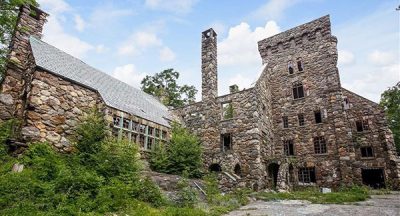Foundation Eyes Decaying Mansion as Climate Change Retreat
News Based on facts, either observed and verified directly by the reporter, or reported and verified from knowledgeable sources.

A foundation dedicated to the conservation of natural resources has submitted a concept plan to the Town of New Castle to redevelop a deteriorating stone mansion to serve as a climate change retreat for scientists.
The Volgenau Foundation is hoping to convert the empty 95-year-old Elda Castle into a climate action center. It was built by Abercrombie & Fitch founder David Abercrombie and his wife and for a time served as their family home.
Under the preliminary plans, the structure on the 50-acre property at 249 Croton Dam Rd. would attract up to 25 renown scientists and other experts at one time for three- to five-day conferences to study, discuss and address issues related to climate change.
Volgenau Foundation Executive Director Andi Pearl said the rationale for selecting the site is to assemble scientists, policymakers and others in a bucolic environment that would help to encourage deeper study, appreciation and attention on the issue as well as have results.
“Our concept here is that there is growing evidence that gathering in thoughtful retreat, in special places like this can foster a deeper connection among its participants,” said Pearl, who noted the foundation mainly operates to provide grants to organizations.
During a virtual New Castle Planning Board meeting last month, the applicant’s attorney, David Steinmetz, said the Volgenau Foundation needs a special permit to allow what is considered an institutional use in a two-acre residential zone.
The foundation’s representatives and professionals met with town staff in June to review their initial plans and gauge officials’ reaction.
“This is a very unique, interesting, and I must tell you, a really cutting-edge and fun application that we are all really proud of – and I should say, anticipated application,” Steinmetz said.
Plans would restore the Elda Castle so it maintains its 1920s character while it would be fitted with renewable energy features, said Matthew Krissel, the project architect. It would contain meetings rooms and a dining facility, he said.
To help make the site conducive for the use, the applicant plans to build about 25 “micro cabins,” small units of no more than about 300 square feet each that would serve as lodging for the center’s visitors, he said. Each cabin would contain a bed, a desk and a bathroom.
The landscape will be maintained and the cabins will be designed and built to standards that are consistent with sustainability, all part of the center’s mission, Krissel said. It would be part of a stewardship plan to maintain a mature ecosystem, reducing impervious surfaces and protecting natural resources, he said.
“This is about a big, quiet, reflective space and maintaining an atmosphere is a big part of that design,” Krissel said.
Irene Krarups, executive director of the V. Kann Rasmussen Foundation, an organization that advocates for bolstering environmental research, told the Planning Board that it is envisioned that the site would host about 40 of the multi-day retreats a year, nearly all on weekdays. There would be another 15 to 25 one-day conferences and other events that involve local or regional conservation groups, she said.
There would be minimal additional traffic on Croton Dam Road and Allapartus Road along the eastern side of the parcel, Krarups said, because it is anticipated that once on-site, retreat attendees would remain on the property most of the time. There could be a trip for a dinner at an area restaurant during their stay but there wouldn’t be daily ingress and egress by the participants, she said.
Krarups added that many hotels and conference centers generally don’t book for gatherings of this size.
“We’re trying to get people to this place to really focus, and there aren’t many hotels that will fit this group and what they need to accomplish, this kind of deep dive in a quiet and quaint setting, and where there’s nobody else there,” Krarups said.
While the Planning Board didn’t address specific details about the proposal, members expressed that it would be an outstanding use of the site. Board Chairman Robert Kirkwood called it an “extraordinarily exciting project.” A multitude of planning-related questions will be posed should a formal application be submitted.
“I think it’s a superb use of the property,” said Kirkwood. “I don’t anticipate, especially with the sensitivity that you have used with your design teams, I don’t anticipate any kind of issues and problems.”
A key issue to be resolved are the options for water and sanitary sewer service for the property, including exploration of entering a town water district or searching for private wells and an on-site wastewater treatment facility.
Steinmetz said the Volegenau Foundation would submit an application to the town and return to the board.

Martin has more than 30 years experience covering local news in Westchester and Putnam counties, including a frequent focus on zoning and planning issues. He has been editor-in-chief of The Examiner since its inception in 2007. Read more from Martin’s editor-author bio here. Read Martin’s archived work here: https://www.theexaminernews.com/author/martin-wilbur2007/
